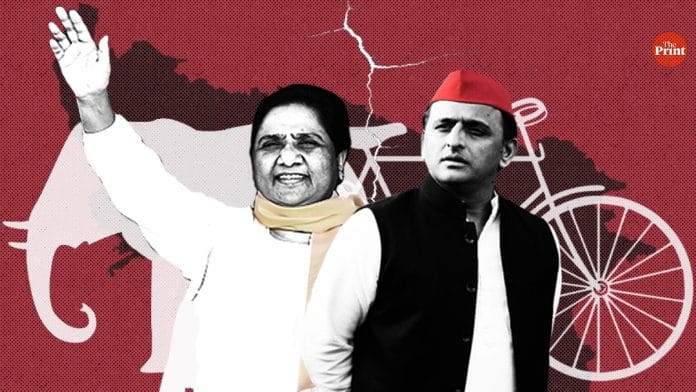Mayawati Tuesday hinted the BSP will contest assembly bypolls in UP alone, after blaming SP chief Akhilesh Yadav for the alliance’s drubbing in 2019 elections. Yadav declared the SP too is ready to go it alone while party MLA Hariom Yadav said only BSP had benefitted from the alliance. The Congress-JDS alliance in Karnataka too had failed to transfer votes to each other’s candidates.
ThePrint asks: With gathbandhan politics in turmoil, is the ‘vote transfer’ theory a myth?
After Charan Singh, Mayawati is the only politician with ability to transfer votes to any party or leader
 Danish Ali
Danish Ali
MP, BSP
BSP’s vote is transferable, and everyone knows that. In my own constituency, Amroha, around 99 per cent Dalits and 99 per cent Muslims voted for me in the 2019 elections. It is true that the Yadav votes didn’t get transferred to the BSP, but we are not sure about the reason. The Jatt voters too didn’t support the SP-BSP alliance in a manner we had expected. In fact, they didn’t vote for even the Jatt candidates.
But none of this is enough for us to conclude that the BSP vote is no longer transferable. Everyone knows that in the history of Indian politics, there have been only two leaders who possess the ability to get their votes transferred to any party and any leader. One was former prime minister Chaudhary Charan Singh, and after that there has only been Mayawati.
Of course, the results failed to match our expectations and the impact we thought a strong alliance would have on the electorate. But the failure of vote transference isn’t the only reason why the BJP won and the gathbandhan lost. There are multiple reasons behind the kind of mandate we got. The opposition failed to expose issues of EVM faltering, or challenge the way BJP marketed their fascism combined with their communalism.
Until booth results are in, it’s premature to say whether votes got transferred between SP and BSP
 Rajeev Rai
Rajeev Rai
Spokesperson, Samajwadi party
We need to do a proper analysis of the reasons why the SP-BSP coalition failed to earn the trust of voters in Uttar Pradesh during 2019 Lok Sabha elections. To my mind, it looks like there can be two possible reasons. The first reason can of course be that the vote transfer between the SP-BSP didn’t happen as planned. But another reason could also be that upper caste votes and most backward caste votes shifted en masse to the BJP.
Either could be true, but we will only know for sure when all the booth results are individually analysed. Constituencies populated with Kurmis, or those with high Kushwaha population, or Yadav population — who did these constituencies and booths vote for? Every booth has a distinct voting pattern, and we need to read each of them individually.
Until we get our diagnosis right, a treatment of the problem isn’t possible. At this moment, it is premature to conclude whether the votes got transferred or not.
That said, we do need to seriously introspect what went wrong with our preparation. There have to be reasons that explain our defeat and we need to reflect on the same. We need to take a collective measure based on whatever conclusion we arrive at from our analysis.
Also read: Why Akhilesh Yadav & SP have reason to feel ‘cheated’ by Mayawati & her BSP
Alliance alone doesn’t bring votes; political logic, caste calculus & recent history are crucial factors
 Sandeep Shastri
Sandeep Shastri
National co-ordinator, Lokniti Network
Alliance politics often works on a simplistic assumption of vote transfer. A mechanical extrapolation of vote share in previous election is calculated, and the statistic then used to ascertain which partner has an upper hand. In the 2019 Lok Sabha elections, it was a much-hyped principle, especially in Uttar Pradesh, Karnataka and Jharkhand. In all three cases, the projected math finally did not add up. Why? The answer lies in looking at the multi-track factors that define and decide electoral outcomes. Besides electoral arithmetic, political logic, caste calculus and contemporary history all play equally important roles.
Political logic behind the alliances in UP and Karnataka may have considerably since the last election. Similarly, caste calculus can change any electoral arithmetic. If the gathabandhan could garner bulk of the Yadav, Jatav and Muslim votes (40 per cent), the BJP ensured a mobilisation of the non-Yadav OBC, non-Jatav Dalit vote and upper caste votes (60 per cent).
Finally, those who rely exclusively on vote transfer tend to ignore the impact of contemporary history or the ground-level chemistry. Leaders come together and form an alliance for their own political interests. It does not flow out of a natural corollary, which would make workers from two different parties who have been adversaries for years to suddenly start working together under the alliance tag. We are still one level away from voters who would naturally be persuaded into voting for someone she considered a traditional rival until the alliance came up.
Election victories are much more than strategising about formal vote transfers. They are about the context of politics at the time of the elections and its wider ramifications.
Modern-day voter has shifted from alliance model to one that promises inclusive development
 A.K. Verma
A.K. Verma
Director, Centre for the Study of Society and Politics (CSSP), Kanpur
Coalition or gathbandhan is an established part of parliamentary democracy. But it comes with certain values. The SP-BSP alliance entered into by Akhilesh Yadav and Mayawati was doomed to be a failure because it was wrongly premised on mutual transfer of votes to each other.
The top leaders seem to be taking their constituency and support base for a ride. Without providing any rationale for gathbandhan, Akhilesh and Mayawati entered into a pre-poll alliance before the bypolls in 2017, putting aside 25 years of animosity between them and their rank and file.
Both repeated this mistake in 2019 Lok Sabha elections. In 2017 Uttar Pradesh asssembly elections, Akhilesh Yadav’s SP had allied with Rahul Gandhi’s Congress, while Mayawati had gone for the second edition of her social engineering – the Dalit-Muslim coalition. Both suffered humiliating defeats. When the SP and the BSP came together ahead of the 2019 elections, people must have felt annoyed and may have perceived statements against the Modi government as an aspersion cast on their own judgment.
The modern-day voter has shifted from the alliance model to share market model of electoral behaviour, where the issue of caste-based identity politics has become obsolete and inclusive development promising more development has become the dominant narrative. This has blasted the myth of captive vote-bank. Unless our politicians understand this new phenomenon, they will always be in for shock through gathbandhan politics.
Also read: Kanshi Ram ran BSP military-style. The problem is Mayawati runs it like a bureaucracy
The reason votes do not get transferred to alliance partner is often due to candidate’s caste
 Prithvi Datta Chandra Shobhi
Prithvi Datta Chandra Shobhi
Social historian and professor, Krea University
There was considerable skepticism about the viability of the electoral alliance between the Janata Dal (Secular) and the Congress because the two parties had been sworn rivals in southern and central Karnataka. They had competed fiercely against each other as recently as in the 2018 assembly elections. Although political compulsions compelled the two parties to come together and form a coalition government in May 2018, did the party activists and supporters reconcile to this new political reality?
The miserable electoral performance of the JD(S)-Congress suggests that the answer is an emphatic no. The activists and supporters of both parties didn’t reconcile to voting for the candidate from their coalition partner. On the contrary, the evidence from Karnataka suggests that the disgruntled supporters, irrespective of their party affiliation, found a reason to support the BJP candidate. Often, caste was the primary reason in their decision. For example, in Mysore and Chikkaballapur, Vokkaligas supported BJP candidates from the Vokkaliga community, instead of voting for OBC candidates fielded by the Congress.
Here are three simple insights that can be gained from Karnataka. First, vote transfer will not happen automatically just because of an alliance. Second, the reason for non-transfer of the vote is often candidate’s caste. Third, the personal appeal of a charismatic leader like Narendra Modi could disrupt the logic of gathbandhan politics, thus providing an alternative for the disgruntled voter of alliance partners.
By Fatima Khan, journalist at ThePrint.







Top leaders of parties, sitting in A/C rooms and adding up vote shares and seats on their calculators, begin to believe that 2+2 makes 22, and forthwith announce Gathbandhans,, Alliances , Fronts etc etc. They NEVER ask the party workers and cadre what the situation is on the ground. How can workers, the very backbone of any party, at once switch their loyalties on the whims ( and selfishness) of some leaders? There is usually a lot of animosity, grudges, history of violence and mutual distrust between workers of two/ three political parties, who cannot stand the sight of each other on the streets, which is where the battle of votes actually takes place. Even if they “OBEY” their masters, they will register their protest silently by ensuring that the votes that they control do NOT go to the alliance candidate thrust on them by their top brass. BEST EXAMPLE. Mandya, and Tumkur, Karnataka , where the son of the Chief Minster could not win in his own party stronghold, losing t o ‘Independent’ Sumalatha. And, the former PM H.D.Deve Gowda, who lost in Tumkur, a Congress held constituency, gifted away to the JD(S), without any regard for the staunch Congress member who held it. . The worst political calculations of this kind are made most often by Congress, which NEVER seems to have a clue about the ground situation, ANYWHERE in the country, but makes highly pretentious claims to being the “ONLY Pan Indian political party”. Lol.
Difficult to see what Ms Mayawati will gain by going alone. It would have been more productive for the two alliance partners – actually, three – to sit together, analyse the results threadbare, figure how the model which worked in Kairana, Phulpur, Gorakhpur came apart for the general election. Whether the concept itself is flawed or there were overwhelming forces at work. 2. Consider Rajasthan. Vaibhav Gehlot losing from Jodhpur by four lac votes, a constituency his father has represented five times. Trailing by 19,000 votes in the Assembly segment which CM Gehlot has adopted since 1998. 3. These are difficult times for the opposition. Not a time to lose one’s nerve, or one’s head.